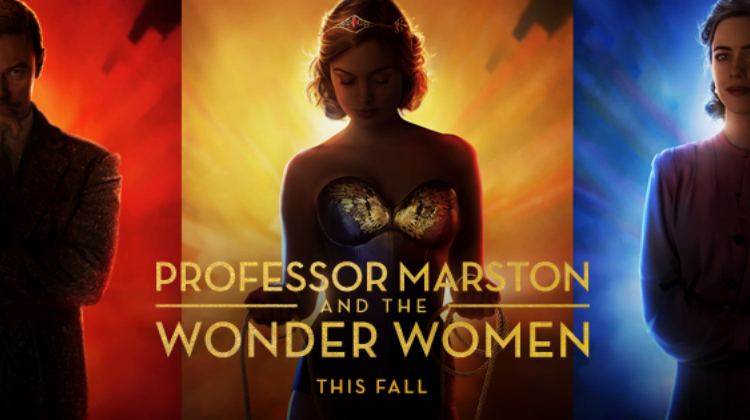
Later this week fans the world over will be treated to the theatrical release of ‘Professor Marston and the Wonder Women’, a new film that tells the story of renowned psychologist William Marston, known largely for creating the Polygraph (Lie Detector) as well as famed comic book heroine ‘Wonder Woman’, and the polyamorous relationship between his wife and his mistress. During their time (as this story is told in the early 1940’s), both their unique relationship and the stories told in Marston’s ‘Wonder Woman’ comic books were largely looked down upon by society and were the source of much controversy.
This week at New York Comic Con 2017, we were lucky enough to sit down with the film’s writer and director Angela Robinson, as well as stars Luke Evans (William Marston) and Rebecca Hall (Elizabeth Marston) to talk about just what makes this film such an amazing and truly unique piece of pop culture history. Check out the full interview below!
This movie is obviously following the huge wave of success from the ‘Wonder Woman’ movie earlier this year, but do you think this year has become the “year of the Wonder Woman” because of the current world status? Like how things are kind of not great in the world at large, and is that kind of leading into the success of this kind of series and an origin story about ‘Wonder Woman’ herself? 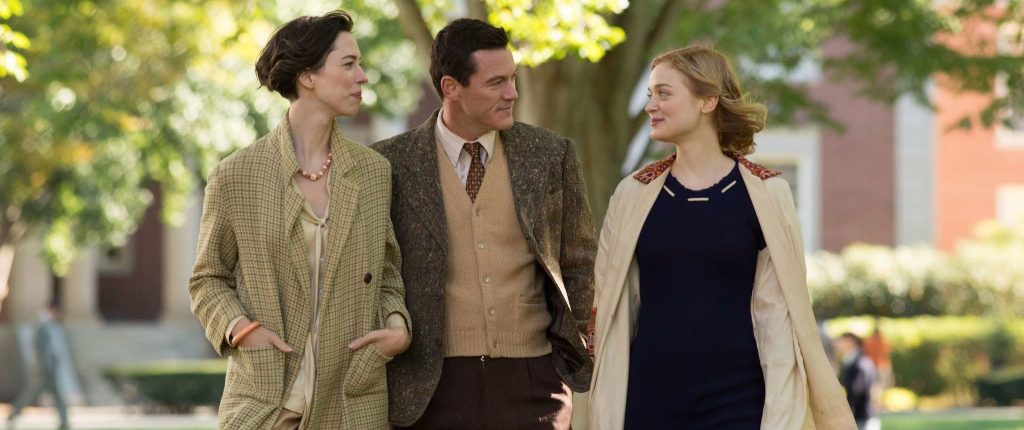
Angela Robinson: I think so! I really do feel like, it’s funny when we made the movie a year ago, we were all talking about how we were going to have our first female President of the United States just around the bend. Even just watching the EPK is like a time capsule of two weeks before the election. But I do feel that the success of ‘Wonder Woman’ like she has a new message. Which is a message of peace and stopping war, and she’s the only superhero that was created to do that. And I really feel like it’s a refreshing message that people are longing to hear. I think that’s part of the success, that’s she’s literally saying something different.
How much research did you do to get this story and tell it truly in a way to show that it was actually a polyamorous relationship and not just that he forced his mistress in on his wife?
AR: I started this as a… I was just a ‘Wonder Woman’ fan, and I was just a big nerd about her and somebody gave me a ‘History of Wonder Woman’ book, and there was a chapter in it about the Marstons, and that was about eight years ago. Now there’s all this information and I had to kind of dig! I went to the Smithsonian and read all his letters to kind of craft the story! But Rebecca actually knew the story before!
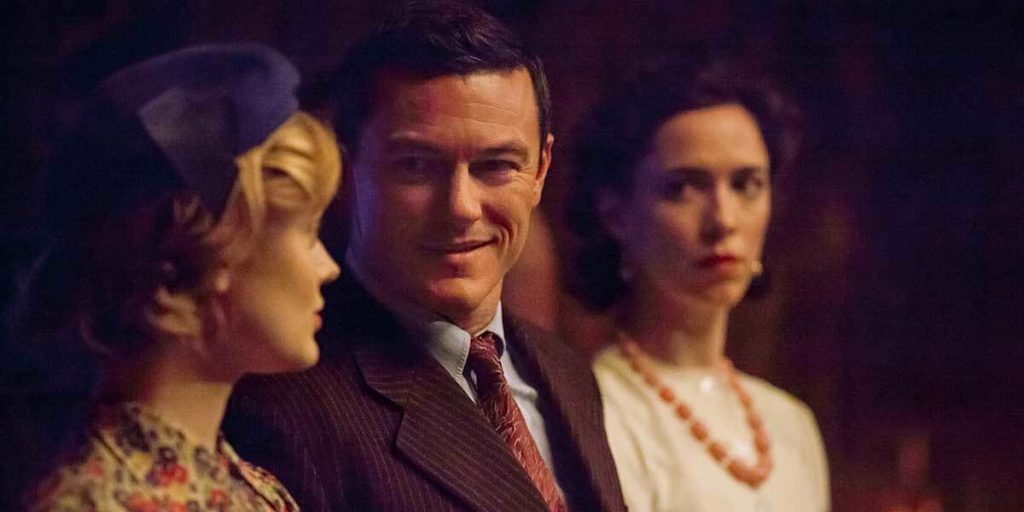 Rebecca Hall: Yes! I knew the story probably since around the time that everybody started knowing the story, because I read that ‘New Yorker’ article that was previewing the Jill Lepore book (‘The Secret History of Wonder Woman’). Then I got an advance copy of the Jill Lepore book! And I became slightly obsessed with it and obsessed that there was a movie in it! And I really wanted to try and make the movie myself! And it didn’t really take, but then I heard that somebody else had been working on it at which point I was like “show me that script immediately!” and “get me in a room with her!”. When I was thinking about it, I was sort of stumbling, because Wonder Woman is such an iconically hopeful superhero, and she’s feminist, and in the original conception of it Marston wrote her as a feminist hero to be propaganda to young boys to accept female authority. And so, I was so taken with this idea that we should get back to the roots of that, but I didn’t really know how to tell the story in a hopeful way when I was thinking about it. And then I read Angela’s script and I was just astonished by how radical it is to take a story about three people in a love relationship and not make the central question of their story the fact that the central dynamic is that one is jealous of the other or that one is kind of struggling. The central dynamic is not internal, its external! It’s that society won’t accept them. How are they going to pay the bills? How are they going to raise children? And that’s kind of a radical way to portray a three way!
Rebecca Hall: Yes! I knew the story probably since around the time that everybody started knowing the story, because I read that ‘New Yorker’ article that was previewing the Jill Lepore book (‘The Secret History of Wonder Woman’). Then I got an advance copy of the Jill Lepore book! And I became slightly obsessed with it and obsessed that there was a movie in it! And I really wanted to try and make the movie myself! And it didn’t really take, but then I heard that somebody else had been working on it at which point I was like “show me that script immediately!” and “get me in a room with her!”. When I was thinking about it, I was sort of stumbling, because Wonder Woman is such an iconically hopeful superhero, and she’s feminist, and in the original conception of it Marston wrote her as a feminist hero to be propaganda to young boys to accept female authority. And so, I was so taken with this idea that we should get back to the roots of that, but I didn’t really know how to tell the story in a hopeful way when I was thinking about it. And then I read Angela’s script and I was just astonished by how radical it is to take a story about three people in a love relationship and not make the central question of their story the fact that the central dynamic is that one is jealous of the other or that one is kind of struggling. The central dynamic is not internal, its external! It’s that society won’t accept them. How are they going to pay the bills? How are they going to raise children? And that’s kind of a radical way to portray a three way!
Luke Evans: They wanted to live a very normal life! They didn’t want to be treated differently than anybody else, to their next-door neighbors, so they did live a very formulaic existence. That’s the way it was! They tried to bring their children up in a way that they didn’t think they were different to anyone else.
AR: And we really try to tell that in the film. I’m still right now blown away because Gloria Steinem watched the movie and really loved it, and she gave us a quote about how “this is a film about love”! Because it was really important to portray their story organically. I really didn’t want to “otherize” their experience or be like “oh look at them, they’re freaky!”. I just wanted to tell a really organic love story.
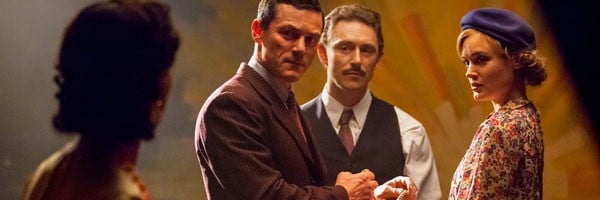
Many critics seem to be focusing on the bondage imagery and how that all works, and the polyamory aspects of it. As this kind of commentary pops up, how are you going to come back so that they understand that this is a very different story?
AR: I think it was very important to me as a filmmaker to not treat the… we have all of these words today to describe what they were doing. We have “poly” or “BDSM”, or “Kink”. But they didn’t have those words to describe what they were doing, and I don’t think that there were even identities as such. When I was telling the story, it’s just what they were doing! And I really as a filmmaker didn’t want to wink at it or be coy. It’s just what they were doing, it’s part of their love life.
Why do you think William started to pursue Olive, and how did he bring her into the relationship, and why was Elizabeth so cavalier and accepting of it?
LE: They were looking for a research assistant because they were very close to discovering the elements that later on made them the polygraph. And that’s what he did as a Professor at Harvard. You’d have research students and you’d open it up and see who would come along and help you. She was really there to help both of them with their research! And she became part of the team before anything else, this was part of their research that they were doing on what the signs were that the body gives off when you’re lying. And through that thing they were very open and very forward thinking human beings. They talked a lot, and the film really shows that in its true form! They talk about how they feel and what makes them feel and I think through those conversations that they were attracted to the same person.
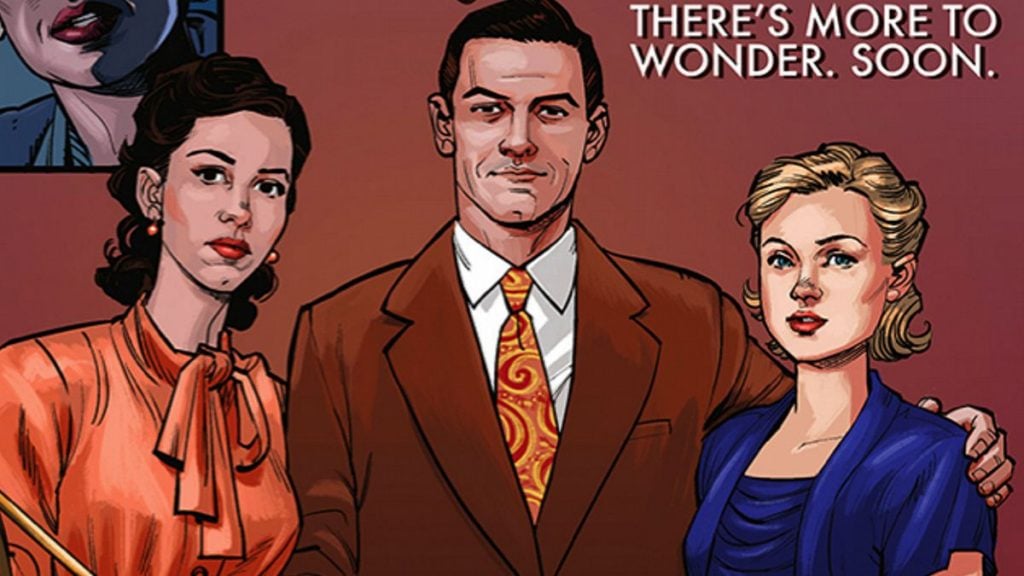 RH: I think it’s easy to guess, or sort of have this misconception of history that we have been progressing towards some sort of social more liberal ways of thinking, and actually it’s been like this! And the 1920’s were actually really surprising moment in lots of different countries. In England too! There’s all these sort of movements and free thinking and kind of a “dawning of the age of Aquarius” sort of stuff. And they were part of that. And certainly when Angela conceived Elizabeth, she is someone who would always choose the posing contrary. She’s got a brilliant character structure!
RH: I think it’s easy to guess, or sort of have this misconception of history that we have been progressing towards some sort of social more liberal ways of thinking, and actually it’s been like this! And the 1920’s were actually really surprising moment in lots of different countries. In England too! There’s all these sort of movements and free thinking and kind of a “dawning of the age of Aquarius” sort of stuff. And they were part of that. And certainly when Angela conceived Elizabeth, she is someone who would always choose the posing contrary. She’s got a brilliant character structure!
AR: And what’s really interesting is that I did a lot of research on the early psychologists and they were psychologists! So they really were quite literally engaged in the study of emotion, which was very literal at the time. Like it was literally “how do I feel right now?”, and being very truthful about those feelings. One of the things the film talks about is living your truth, and trying to be true to that, which is a lot of what Wonder Woman represents, down to the lie detector! I mean, down to the Lasso of Truth, and the connection to the lie detector. So I feel like what’s interesting is that the characters ultimately are just engaged in the pursuit of living and being true to themselves and being true to their lives, and that the film is about the conflict of whether the world is going to let them do that, or how do they live their true selves in a world that doesn’t want to accept them?
Would you say there’s maybe an element, especially following Greg Rucka’s recent run of ‘Wonder Woman’, that maybe your movie might be part of reclaiming Wonder Woman as a queer icon?
AR: I do think that! I’m so just… Personally? I consider myself a queer filmmaker, and I was so happy that Greg Rucka made Wonder Woman’s bisexuality cannon! I think that is really important because I feel like representation is really important. And the ability for people to see themselves in pop culture and to kind of in some ways reclaims characters? I feel like the Marstons have been hidden from history and now is that time to kind of go back and look at the people whose ideas and ideals formed this icon we all love today! I think it’s important!
What kind of roadblocks does a film like this still come up against?
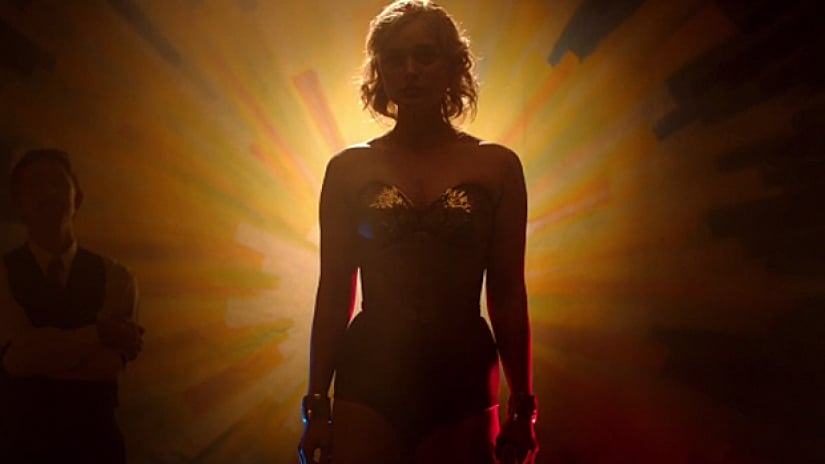 AR: The same old roadblocks that any independent film goes up against? Surprisingly I didn’t get a lot of roadblocks on the content, which is where I thought a lot of people might have issues. But it’s the same problems any indie filmmaker has like budgets, casting, trying to get somebody to give you the money haha. Finding a distributor and getting a release, and Sony’s Stage 6 were incredible, and I had been trying to get the movie actively made for four years and it took four years to write and four years to try and get it made, and they finally fell in love with the script and pulled the trigger and then after we had the film Annapurna came on board to distribute it, which was amazing.
AR: The same old roadblocks that any independent film goes up against? Surprisingly I didn’t get a lot of roadblocks on the content, which is where I thought a lot of people might have issues. But it’s the same problems any indie filmmaker has like budgets, casting, trying to get somebody to give you the money haha. Finding a distributor and getting a release, and Sony’s Stage 6 were incredible, and I had been trying to get the movie actively made for four years and it took four years to write and four years to try and get it made, and they finally fell in love with the script and pulled the trigger and then after we had the film Annapurna came on board to distribute it, which was amazing.
Can you tell us a bit about your first experience with ‘Wonder Woman’ and how you first found the character?
LE: Linda Carter!
AR: Linda Carter for sure! I have a lunchbox with her on it still! But Linda Carter like sealed the deal for
RH: I can’t believe it but I’m going to say Linda Carter too! I can’t remember but probably Linda Carter.
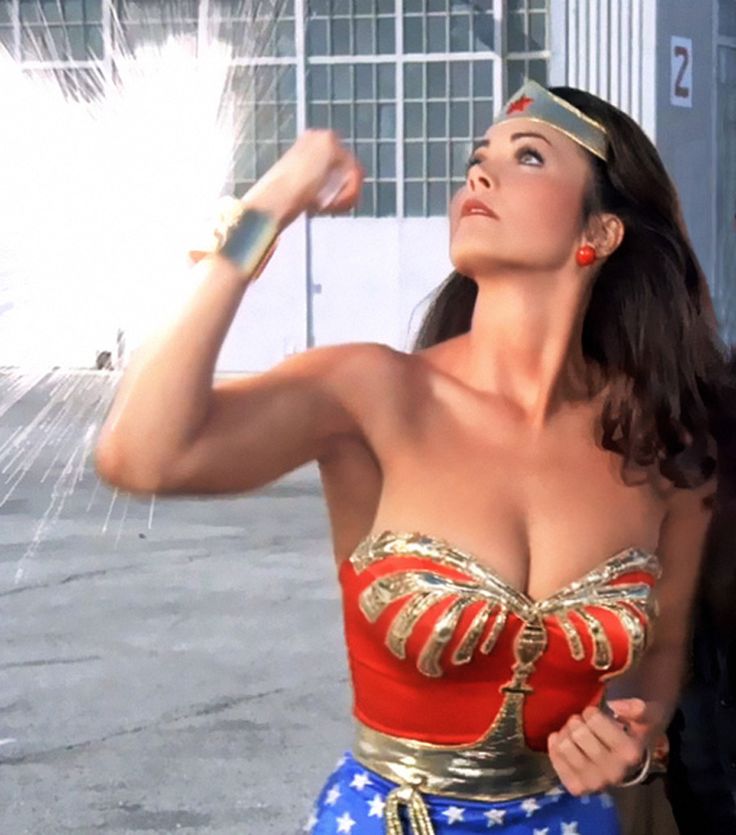 Now that you’ve spent some time with these characters of the Marstons, did you find yourself going back and reading more ‘Wonder Woman’ comics?
Now that you’ve spent some time with these characters of the Marstons, did you find yourself going back and reading more ‘Wonder Woman’ comics?
RH: Yes, I’d say so!
LE: I’ve come across a few! And you can’t help but pick them up because once you know who the writer was and you know their story, things jump off the page and the story and it wouldn’t necessarily happen to anybody else reading it.
RH: I started reading some of them as research, and I’m going to fess up, I hadn’t read much of them before that. But I had started doing some for research and when the film ended I found myself reading more different versions of the character! My favorite is Grant Morrison. It’s racy and very modern!
AR: He really took and re-explored Marston’s themes very directly in ‘Wonder Woman: Earth One’, and that was awesome!
‘Professor Marston and the Wonder Women’ stars Luke Evans, Rebecca Hall, Bella Heathcote, Connie Britton, and Oliver Platt. The film is set to release in theaters on Friday, October 13th, 2017. Be sure to stay tuned to ScienceFiction for all the latest updates on ‘Professor Marston and the Wonder Women’!
